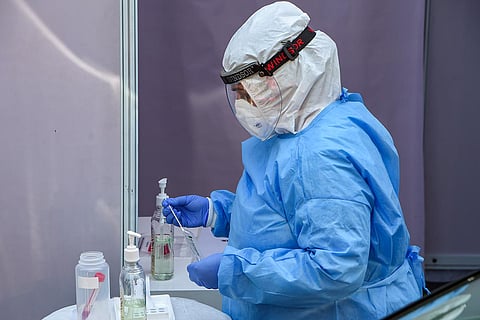

Two government research bodies at the forefront of the fight against the coronavirus in India are in the process of initiating a population-based serosurvey to monitor the trend in prevalence of the infection at the district level, the Union Health Ministry said on Monday. The survey will be done in select districts.
A serosurvey involves testing of blood serum of a group of individuals to determine the presence of antibodies against that infection. The Indian Council of Medical Research and the National Centre for Disease Control will collaborate with key stakeholders for the survey at 10 health facilities (six public and four private) to spearhead this.
The ministry said in a document uploaded on its website that there is a need to establish systematic surveillance for SARS-CoV-2 infection in all districts of the country. "This surveillance will be in addition to the routine testing as per current testing guidelines," it stated.
The survey will be conducted in 69 randomly selected districts from 21 states. "The survey will involve collection of venous blood samples from 400 randomly selected individuals (one per household) from 10 clusters in each district. Sera from these individuals will be tested for presence of IgG antibodies using ELISA test developed by ICMR-National Institute of Virology (NIV), Pune. The results of the survey will provide information about spread of SARS-CoV-2 infection in different parts of the country," a press release by ICMR said.
ELISA or COVID KAVACH ELISA, is a type of biochemical test which can be used to detect antibodies formed against SARS-CoV-2 in a person’s blood. TNM had reported earlier: “An ELISA microplate has several tiny wells as pictured, which are all coated with an antigen to a specific antibody, in this case, this is the IgG antigen that forms naturally in response to infection with SARS-CoV-2. Different dilutions of the person’s blood sample are taken and deposited in each well. If the antibody to the IgG antigen for COVID-19 is present, the solution in the well will change colour, which indicates that that sample is positive for the antibody to COVID-19.”
The survey will test outpatient attendees (non-Influenza like illness or non-ILI patients) and pregnant women among the low-risk group, and health care workers among the high-risk population.
Further, at least 100 samples per week and 400 per month of healthcare workers from selected districts will be tested.
An earlier document from the government stated that throat/nasal swabs will be collected for RT-PCR tests and samples would be tested in a one-time pool of 25. "Results of this sample pooling are only for surveillance purposes. It should not be used for diagnosis of individual patients. In addition to throat/nasal swabs, blood samples should be collected for detecting IgG antibodies for ELISA testing. In subsequent rounds, IgG ELISA based testing of serum samples will replace RT-PCR based testing for surveillance purpose," it said.
In the serosurvey, the data on demographic characteristics will be collected on a specifically designed standard data collection form. It will be analysed locally for action using standard indicator formats. Indicators for person, place, time and trend analysis will be made. Data collation and dissemination will take place as decided jointly by ICMR and department of health and family welfare.
The most number of districts where the survey will be done are in Uttar Pradesh (9), followed by Maharashtra, West Bengal and Bihar (six each). Among the southern states, the following districts have been selected for the survey:
Andhra Pradesh: Krishna, SPSRNellore, Vizianagaram
Karnataka: Bengaluru Urban, Chitradurga, Kalaburagi
Kerala: Palakkad, Ernakulam, Thrissur
Tamil Nadu: Thiruvannamalai, Coimbatore, Chennai
Telangana: Kamareddy, Jangoan, Nalgonda
This survey is also supported by the World Health Organisation (WHO), which had last month announced a global study called Solidarity II to understand how many people have been affected by the novel coronavirus. The program will see participation from over half a dozen countries. The idea is that antibody testing will allow for detection of COVID-19 cases that have milder symptoms which may have been missed earlier.
(with PTI inputs)
(This story has been updated with details from the ICMR press release.)